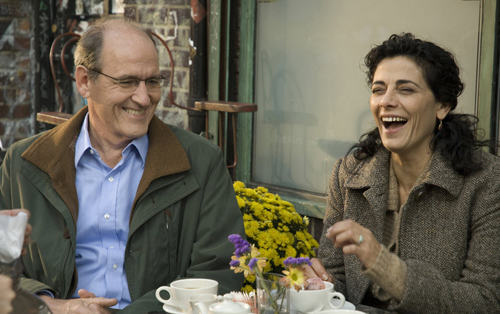
There's no sophomore slouch for actor-turned-writer and director Tom McCarthy. After The Station Agent, he returns with a mature and complex tale, lined with rich performances from veteran actors Richard Jenkins and the internationally renowned Hiam Abbass who makes her U.S. film acting debut. The story about a lonely professor whose path is crossed with several immigrant inhabitants of the culturally diverse New York city is both an original and an involving film that that stimulates the senses.
The Visitor is political film without being preachy, romantic without being cheesy, and entertaining without being dumb. Written by McCarthy, this showcases real people with real problems that you hear about but rarely see on the big screen. Fluidly directed by McCarthy who has no difficulty in sliding behind the camera, this small, independent film allows actors like Jenkins and Abbass to excel in their lead roles. Anybody looking for a smart and entertaining film about real people will want to seek this out once it hits theaters this coming friday - it may just be the best film so far in the new year.
I met with the Tom McCarthy (and the cast) at the Four Season's Hotel in Beverly Hills.
Yama Rahimi: First of all I loved the film which I think is the best film so far. I was impressed with the balance you kept without going overboard which is a "tightrope" for any writer.
Tom McCarthy: Yeah that was the big challenge...how to manage the two stories lines, one is a man's emotional journey and this young man's journey downward. Richard (Jenkins) was the anchor of the story. He's so subtle and much of the first part is passive. I came back to his relationships with the characters.
YR: "The Station Agent" came out in 2003 and this film now. Tell us about this project!
TM: Slowly. (Laugh) After I finished "The Station Agent". It took a long time with award season and foreign releases which takes a lot of time and energy. Then I went into acting projects. Then helped Pixar with one of their projects and some other projects. I started to think about my next project after I went to Beirut on the State Department's behalf to show "The Station Agent". Then I went back there and made a lot of friends. I will be honest but I didn't have many Arab friends as I do now. It was an eye opening experience to me that as an American I really didn't know much about the Middle Eastern culture and history and I consider myself a well read and traveled person. I thought if I know so little then what's the rest of the country like. That was a big part of the history. I met characters like Tariq and wanted the world to know them as well.

YR: How much research did you?
TM: Quite a bit. I traveled a lot and as an writer you make a lot of mental notes. So as an writer you make it personal. I did a lot of research on immigration and law in this country and a lot of it didn't get into the script since it would have too much. I talked to detainees and officers so I got an impression of what's like. It's a very complex issue that's you can't address it all in one film.
YR: ...well you brought a perfect balance that you addressed the issue but without being preachy. I also loved how you brought the music into the story from classical music to exotic music of Djembe.
TM: Actually I'm not a musician so it was easy to put myself in Walter's position. On my research about Africa I read this book called "The Prophet of Zongo Street" and found out the author Mohammed Ali was living in Brooklyn and also a musician playing the Djembe. So I tracked him down and he said what do I want from him. I said I don't know but told him to show me how to play the Djembe. So he would come and give me lessons. I did it to have Walter's journey with the instrument.
YR: How was Richard (Jenkins) with the instrument?
TM: Actually Richard had experience with drums so he had a rhythm and played it in the film. He actually knew more than Haaz did.
YR: Tell me about the casting Hiam Abbass. I'm a great admirer of her but not many people know her in the US.
TM: I was the same way. I first saw her in Beirut in a film called "Satin Rouge", then I saw The Syrian Bride and Paradise Now. I said who's this woman. I have to meet her. So I went to Paris and stalked her. I told her I have this project but she had no idea who I was nor had she seen The Station Agent. At first she thought I was weird that I kept asking her for another lunch, then another. So it started there I was picking up on her brain and came back the next summer with the script. So I wrote the part as much for her as I did for Richard.



No comments:
Post a Comment